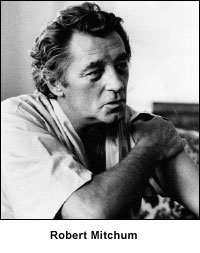
I’ve certainly waxed eloquent about Big Ol’ Robert Mitchum on more than one occasion: Mr. World Weary, sometimes a lug, often a thug, an unforgettable mug, sleepy-eyed and perpetually laconic, barrel-chested, with a voice emanating from some cavernous depth of his soul, a heart polluted by irony and a head filled with the simplest of desires--to be left alone, daddy. The newly released The Friends of Eddie Coyle (1973) has long resounded as one of Mitchum’s finest, despite and because of the fact that he’s in his later stage, more lumpen, decidedly slower, unsettlingly vulnerable, an aging but still wily lion in a jungle that’s become overtly desaturated.
Despite the unarguable fact that Mitchum as Coyle was indeed a both brilliant stroke of casting and a stirring and remarkably unselfconscious execution of a role, the movie has a bit more going for it. Brit director Peter Yates (Bullit, Breaking Away), possibly infected by temporary wisdom that many practioners of 70’s American cinema seemed to have collectively drawn upon, crafts a crime movie that simultaneously impacts as bonafide (and effecting) character study and a sideways exploration of the slow deterioration of the codes of masculinity. Yates, virtually working on the pinpoint level of a Robert Altman or a Hal Ashby, doesn’t flaunt a plot point, underline the action, or even zigzag around the merry-go-round. The movie just unfolds, a series of modulated interactions, predominately set in parking lots, way stations, coffee shops, dive bars, suburban enclaves, trailers, neighborhood banks, with nary a hitch in its everyday rhythms.
Of course, author George V. Higgins central conceit was that Eddie Coyle, third-string criminal, was nothing but a working stiff, albeit one with a slowly eroding set of codes, a simple guy with a simple desire-middle class survival. Yates, appropriating another 70’s transmutable element, just lets the movie unwind with no particular emphasis on any of the connective tissue, one way or another, regular citizen, low level law enforcer, big thief , little thief, those times they were a-changing, and your sinkhole is just, well, my sinkhole.
Mitchum lumbers gracefully through it all, a splintered square peg who can’t even find a round hole, a club fighter gasping through the later rounds, a tug boat slowing tearing away from its moorings. He’s bad, he’s sad; he’s a sap without poetry or flair, filled with old school doggedness and a philosophy borne out of inner city tenement origins. Yates surrounds him with some terrific players of the period, each one adding a dash of muted color—Richard Jordan as the curdled justice agent, Steven Keats as the hepped-up gunrunner, Alex Rocco as the blue collar heist man, and the impeccably inscrutable Peter Boyle as the low level bartender/informant that plays them all.
4 comments:
Favorite scene: A drunken Mitchum cheering for #4 Bobby Orr inside the old Boston Garden!
Those in the know have been doing thier best Mitchum (with the slight Boston accent) imitation for years: "Number four, Bobby Orr." (Mighta even attempted it once or twice myself...)
Yeah - great Boston Garden locale-I've said it before and I'll say it again, "Numba faw Bawbie Aw".
An accidentally humane ending but how friggin sad.
PS - Splintered square peg!! yeah baby that is poetry and so is this movie.
Scott,
There is something about Mitchum's voice...when you have 2 minutes to spare, go to my facebook page and find the "music" section and listen to 'Compact Dis.revised' for some Mitchum audio. I would be impressed if you can identify both movies the clips were appropriated from. It sounds better with headphones, of course.
Post a Comment